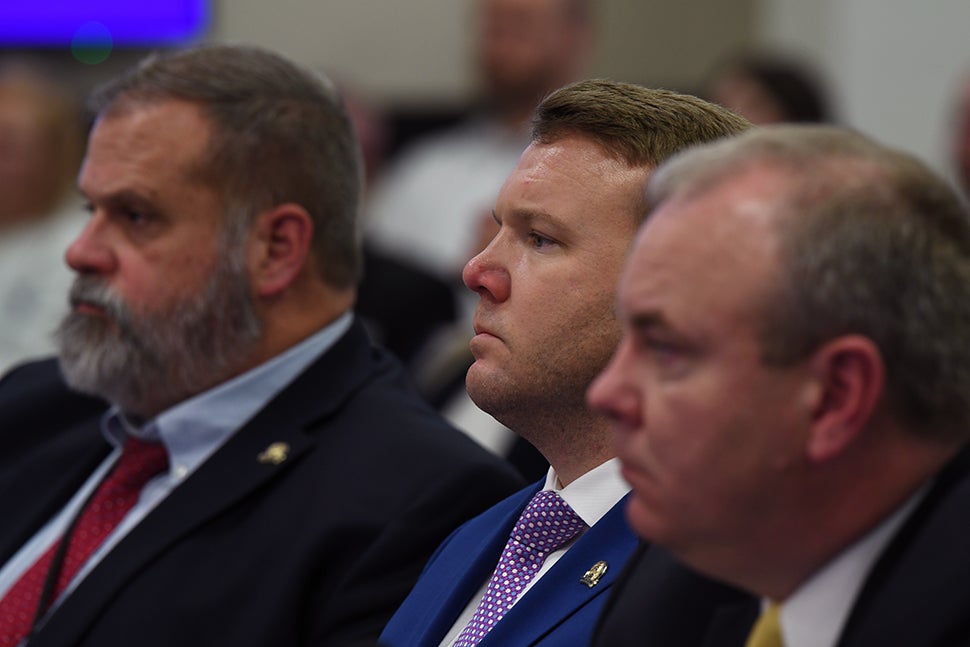How might Supreme Court case impact Kentucky’s Safer Kentucky Act?
Published 1:29 pm Friday, April 26, 2024

- FRANKFORT, Jan. 18 – Rep. Jared Bauman, R-Louisville, (center); Rep. John Hodgson, R-Fisherville, (left); and House Majority Whip Jason Nemes, R-Middletown, listen as members of the House Standing Committee on Judiciary ask questions about House Bill 5, legislation related to crime. (Legislative Research Commission)
The fate of Kentucky’s recently passed “Safer Kentucky Act” may be in the hands of the nation’s highest court.
This week, the U.S. Supreme Court heard oral arguments in an Oregon case dealing with city ordinances that ban outdoor sleeping in certain circumstances.
The City of Grants Pass prohibits camping on publicly-owned property; campsites include any place where bedding is used in order to set up a temporary place to live. According to its municipal code, people cannot sleep on public sidewalks, streets or alleyways for public safety reasons.
People who violate the ordinance may face fines up to several hundred dollars, and repeat offenders may be barred from the city and charged with criminal trespass if they remain.
Several members of the homeless community filed a class action lawsuit against the city, arguing that the ordinances were unconstitutional under the 8th Amendment’s ban on “cruel and unusual punishment.”
After moving through the court system, City of Grants Pass v. Johnson is at the Supreme Court. The court’s ruling could impact similar laws across the country, including Kentucky’s House Bill 5, which bans street camping.
After a violation for a first offense, Kentuckians who unlawfully camp will be charged with a Class B misdemeanor under the new law.
Local governments may, but are not required to, designate indoor or outdoor areas as temporary camping locations for people experiencing homelessness.
‘Involuntarily homelessness’ and other key case details
The City of Grants Pass has one shelter with about 100 beds, Gospel Rescue Mission. However, estimates of the homeless population on a given night range from 50 to 600 people.
The district court in this case distinguished between all people experiencing homelessness and the “involuntarily homeless,” who have no choice but to sleep outside because there aren’t enough shelter beds in the area for them.
“As applied to someone who has nowhere else to sleep, which is an essential human function, the ordinances are the equivalent of making it a crime to be homeless while living in Grants Pass,” said Edwin Kneedler, a Justice Department lawyer arguing on behalf of the Biden administration.
The city’s representative, Theane Evangelis, was adamant that nothing in the ordinances makes the status of being homeless a crime. Instead, it criminalizes certain conduct—sleeping outside.
She argued that encampments are unsafe, unsanitary and are associated with harmful down stream effects.
“So we think that it is harmful for people to be living in public spaces on streets and in parks, whatever bedding materials,” Evangelis said. “When humans are living in those conditions, we think that that’s not compassionate and that there’s no dignity in that.”
These arguments mirrored those of Kentucky lawmakers debating House Bill 5 throughout the 2024 legislative session.
The bill’s sponsor, Jared Bauman, R-Louisville, and other supporters, repeatedly said the bill did not criminalize homelessness.
“It doesn’t take punitive measures against homeless,” Bauman said on the final day of session after HB5’s ceremonial signing. “It takes a loving approach to the homeless. Now, certainly, it is a law and if you violate the law, there are penalties for that.”
Sen. Whitney Westerfield, R-Fruit Hill, tried to add a provision in HB5 that would have required officers to provide referrals for services to help, like shelters and mental health resources, before citing someone. It did not make it into the final bill.
Rep. Chad Aull, D-Lexington, cited a 2023 study that found there are about 2,400 homeless individuals in Fayette County, with up to 800 shelter beds available.
Louisville Democratic Senator Cassie Chambers Armstrong said the bill does criminalize homelessness.
“I’m imagining when an officer goes up to someone who has nowhere else to go and says you have to cease being here, the person says, ‘Where can I go?,’ the answer under this bill is nowhere,” she said.
“You can’t go to a public space, you can’t go to a private space, you can’t go to a park. There’s nowhere for you to go. How are you supposed to cease the offense?”
The Supreme Court justices and the lawyers spent a significant amount of time debating whether the status of being homeless is effectively any different from the conduct of sleeping outside.
They were comparing the Oregon case to another case, U.S. v. Robinson, where the Supreme Court ruled that states cannot punish drug addicts solely due to their status as a drug addict, but can punish the criminal act, or conduct, of using drugs.
City advocate Evangelis argued that the status of being homeless is not being punished, but rather the conduct of sleeping outside.
Kelsi Corkran, the homeless class action representative, argued that there is no “meaningful difference between a law that says being homeless is punishable and a law that says being homeless while breathing or sleeping or blinking is punishable.”
University of Louisville law professor Samuel Marcosson agrees with Corkran. He said he thinks the city will have a hard time “escaping reality” since sleeping is necessary for survival.
Finally, oral arguments included discussion over “necessity defenses,” laws that allow people charged with crimes to argue that it was necessary under the circumstances. Kentucky has a necessity defense law that can be used in court to argue that defendants had no better choice.
How might the Supreme Court’s ruling impact Kentucky?
The Supreme Court could take several paths in this case.
It could rule on the broader question of whether cities and states can enforce street camping bans on “involuntarily homeless” people.
If it rules in the class action’s favor, Marcosson doesn’t have any doubt that it would impact the Safer Kentucky Act.
“The ability of states or cities to treat the homeless based on their status as homeless would constitute a violation of the Eighth Amendment, and that’s exactly what the Kentucky law does,” he said.
If the court ruled in Grant Pass’ favor, the question would be decided and Kentucky’s law would stand.
In a statement, Kentucky Democratic Party Executive Director Morgan Eaves said that while Republicans could have focused on affordable housing funding this session, instead “they made it their mission to make life harder for Kentuckians struggling to land on their feet while costing taxpayers over a billion dollars in the process.”
“Even if the Supreme Court upholds the Grants Pass ordinances, HB 5 is still bad policy and is just plain mean.”
However, neither of those options may be the most likely outcome.
Marcosson said the most probable outcome is the Supreme Court avoiding ruling on the case altogether.
Oregon is a unique case, since its state legislature passed a law blocking Grant Pass’ enforcement of the ordinances at play in this case.
Marcosson said that the Supreme Court could dismiss the case since the homeless population of Grants Pass is currently protected from enforcement, and therefore the ruling wouldn’t change the legal status of either the city or the homeless population.
If that happens, other states, including Kentucky, would likely file similar lawsuits in the hopes that they reached the Supreme Court, Marcosson said.
Former Republican Party of Kentucky spokesperson Tres Watson agreed that the court is likely to rule more narrowly in this case, to specifically address Oregon’s homelessness situation.
“You could spend their entire discretionary fund for a decade, they probably wouldn’t be able to build enough beds to house all the people that are homeless on the streets there,” Watson said.
Since the homeless population is a constantly fluctuating number, Watson said it would be “foolish” to spend most of the budget on homeless shelters during a peak, since the goal is to transition people out of shelters anyways.
“I think that too often we pass the law and kind of wipe our hands clean and say we did it,” Watson said. “This is one where I think, regardless of whether the law stands or not, it’s going to continue to be a problem and we’ve got to make sure that we provide the back end help to continue to work on the issue.”





